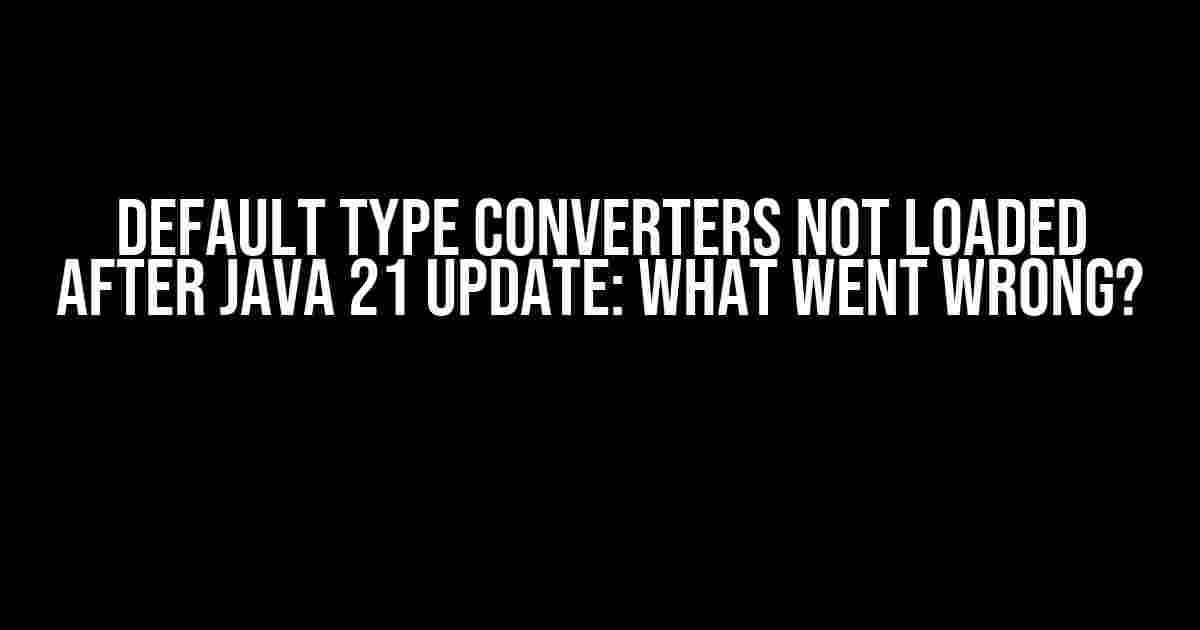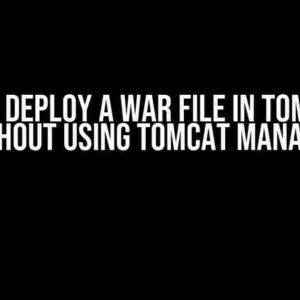Are you experiencing issues with default type converters not loading after updating to Java 21? You’re not alone! Many developers have reported this problem, and we’re here to help you troubleshoot and resolve it.
The Mystery of the Missing Converters
Before we dive into the solution, let’s understand what’s happening behind the scenes. In Java, type converters are responsible for converting data between different formats. Default type converters are a set of built-in converters that come with the Java framework. They’re essential for many applications, including data serialization, deserialization, and JSON parsing.
When you update to Java 21, the default type converters might not load correctly, causing issues with your application. This can lead to errors, exceptions, and even crashes. But don’t worry; we’ve got a step-by-step guide to help you resolve this problem.
Step 1: Check Your Java Version
First things first, ensure you’re running Java 21 or later. You can check your Java version using the following command:
java -versionIf you’re running an earlier version, update to Java 21 or later to take advantage of the latest features and bug fixes.
Step 2: Verify Your Application Configuration
Next, review your application configuration to ensure that it’s correctly loading the default type converters. Check the following:
- Check your application’s classpath: Make sure that the Java 21 runtime jars are included in your classpath. You can do this by checking your project’s build path or the command line arguments used to run your application.
- Verify your application’s module dependencies: If you’re using Java modules, ensure that the required modules are declared in your module-info.java file.
- Review your application’s configuration files: Check your application’s configuration files, such as the properties file or the XML configuration, to ensure that they’re correctly configured to load the default type converters.
Step 3: Load the Default Type Converters Manually
If your application configuration is correct, but the default type converters still aren’t loading, try loading them manually. You can do this by using the following code:
import java.time.format.DateTimeFormatter;
import com.fasterxml.jackson.databind.ObjectMapper;
import com.fasterxml.jackson.databind.type.TypeFactory;
// Create an instance of the ObjectMapper
ObjectMapper mapper = new ObjectMapper();
// Load the default type converters
mapper.getTypeFactory().reset();
// Load the default DateTimeFormatter
DateTimeFormatter formatter = DateTimeFormatter.ISO_DATE_TIME;
mapper.setDateFormat(formatter);This code creates an instance of the ObjectMapper, resets the type factory, and loads the default DateTimeFormatter. This should load the default type converters manually.
Step 4: Check for Conflicting Dependencies
Sometimes, conflicting dependencies can cause issues with default type converters. Check your project’s dependencies to ensure that there are no conflicting versions of the same library. You can use the following command to check for conflicts:
mvn dependency:treeThis command will display a tree of dependencies used by your project. Look for any conflicting versions of the same library and remove or update them accordingly.
Step 5: Try a Clean Build
Occasionally, a clean build can resolve issues with default type converters. Try deleting your project’s target directory and rebuilding your project from scratch. This will ensure that all dependencies are correctly resolved and loaded.
Common Pitfalls to Avoid
When troubleshooting issues with default type converters, it’s essential to avoid common pitfalls that can lead to further problems. Here are a few to watch out for:
- Avoid using outdated libraries: Ensure that you’re using the latest version of libraries and dependencies.
- Don’t duplicate dependencies: Avoid duplicating dependencies in your project’s classpath or module dependencies.
- Use the correct Java version: Ensure that you’re using the correct Java version, as different versions may have different default type converters.
Frequently Asked Questions
Here are some frequently asked questions about default type converters:
| Question | Answer |
|---|---|
| What are default type converters? | Default type converters are a set of built-in converters that come with the Java framework. They’re used to convert data between different formats. |
| Why did my default type converters stop working after updating to Java 21? | The default type converters may not load correctly due to changes in the Java 21 runtime or configuration issues in your application. |
| How do I load default type converters manually? | You can load default type converters manually by using the ObjectMapper and TypeFactory classes in the Jackson library. |
Conclusion
Default type converters not loading after updating to Java 21 can be frustrating, but by following the steps outlined in this article, you should be able to resolve the issue. Remember to check your Java version, application configuration, and dependencies, and try loading the default type converters manually if necessary. If you’re still experiencing issues, try a clean build and review your application’s configuration carefully.
By following these steps and avoiding common pitfalls, you should be able to get your application up and running smoothly with the default type converters loaded correctly.
Happy coding!
This article is a comprehensive guide to resolving issues with default type converters not loading after updating to Java 21. By following the steps outlined above, you should be able to troubleshoot and resolve the problem. Remember to check your Java version, application configuration, and dependencies, and try loading the default type converters manually if necessary. With a little patience and persistence, you’ll be back to coding in no time!
Here are 5 Questions and Answers about “Default type converters not loaded after Java 21 update” in HTML format:
Frequently Asked Question
Get the answers to your burning questions about the default type converters not loading after the Java 21 update!
What happened to my default type converters after updating to Java 21?
It’s a known issue! After updating to Java 21, the default type converters are not loaded automatically. This is due to changes in the Java architecture that affect the loading of converters. But don’t worry, we’ve got a fix for you!
How do I load the default type converters manually in Java 21?
Easy peasy! You can load the default type converters manually by adding the following code to your `pom.xml` file: `
What are the consequences of not loading default type converters in Java 21?
It’s a big deal! If you don’t load the default type converters, you may encounter issues with your application’s performance and functionality. This can lead to errors, data corruption, and even security vulnerabilities. So, make sure to load those converters to avoid any headaches!
Can I still use Java 8 to avoid this issue?
Sorry, friend! Java 8 is no longer supported, and it’s not recommended to stick with an outdated version. You should upgrade to Java 21 (or later) to ensure you have the latest security patches and features. Besides, loading default type converters manually is a small price to pay for the benefits of the latest Java version!
Where can I get more information about Java 21 and default type converters?
We’ve got you covered! Check out the official Java documentation and release notes for Java 21. You can also search for tutorials and guides on popular developer websites and forums. If you’re still stuck, don’t hesitate to reach out to the Java community or a trusted developer for help.





